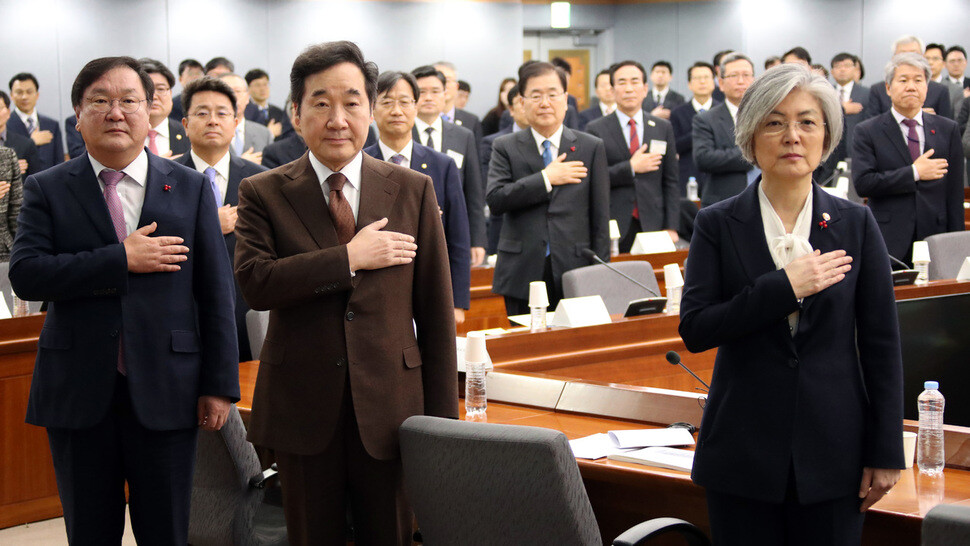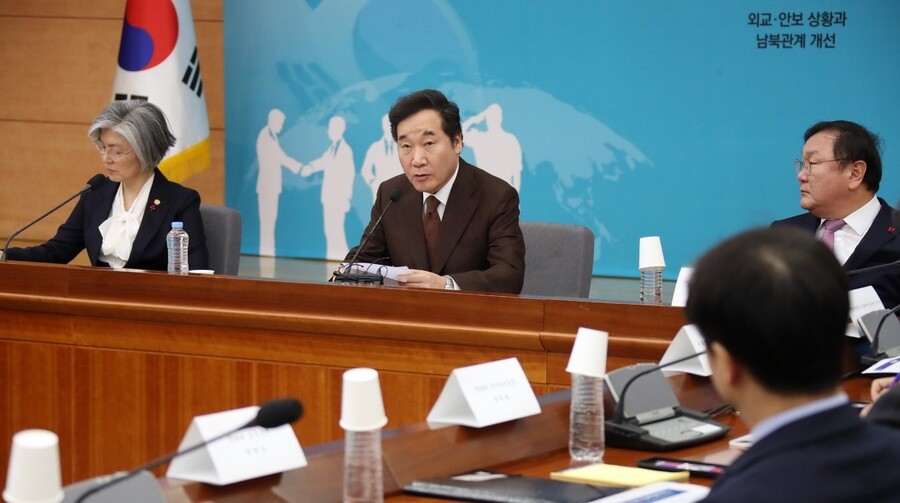hankyoreh
Links to other country sites 다른 나라 사이트 링크
South Korea looks to make high level inter-Korean talks a regular event

The South Korean government is pushing to turn high-level inter-Korean talks into a regular event to carry forward the momentum from its current dialogue for the Pyeongchang Winter Olympics. The Moon administration also plans to focus its diplomatic capabilities on proceeding from the current dialogue into bilateral discussions to resolve the North Korean nuclear issue.
With these efforts, a “road map” for achieving peace and stability on the peninsula is taking clear shape in the areas of diplomacy and unification. The details were shared by five government agencies – including the Ministries of Unification, Foreign Affairs, and National Defense – in New Year’s reports to Prime Minister Lee Nak-yon on Jan. 19 at the annex of the Central Government Complex in downtown Seoul.
■ Pushing for regular high-level inter-Korean talks
In its progress report that day, the Ministry of Unification said it planned to push for regular high-level talks for comprehensive discussions on major issues between South and North. It also announced plans to hold bilateral discussions toward establishing peace on the peninsula by improving inter-Korean relations and forming favorable conditions for denuclearization dialogue if a senior North Korean delegation visits for the Winter Olympics.
The ministry further plans to continue pushing for talks in specific areas, including discussions among military authorities as previously agreed upon by the two sides and Red Cross talks to hold reunions for divided family members. Additionally, the ministry plans to continue working to provide humanitarian aid to vulnerable populations in North Korea and establish a customized support system for North Korean defectors, with policy plans to be announced in February.

In its report, the Ministry of Foreign Affairs said it planned to “focus on bringing North Korea and the US into the dialogue process and pushing for a positive feedback loop between inter-Korean and North Korea-US dialogue.” The message signaled plans to enter later dialogue toward denuclearization as a “key axis in inter-Korean and North Korea-US dialogue.” The ministry also plans to work to persuade Washington to take part in trilateral discussions among the US, South Korea, and China.
The ministry’s goal is to restore exchange and cooperation with China in all areas, developing a genuine strategic partnership relationship in the process. In the case of Japan, the ministry reported plans to restore “shuttle diplomacy” and step up other practical cooperation efforts while working to manage and resolve issues related to the comfort women and other historical matters. The ministry also announced plans to continue diversifying its diplomatic efforts by bringing its “New Southern” and “New Northern” policies to fruition.
■ Increased US strategic weapon deployment, PSI exercises
The Ministry of National Defense said in its progress report that it plans to “strengthen joint exercises for practical deterrence and response capabilities while devising plans to expand the rollout and deployment of US strategic weapons to boost deterrence and responsible capabilities toward the North Korean nuclear and weapons of mass destruction (WMD) threats.”
For the first time, the ministry announced plans to take part in the Nimble Titan war games held by the US Strategic Command as a ballistic missile defense exercise. The ministry also signaled plans to participate in July exercises for the WMD Proliferation Security Initiative (PSI). On the issue of inter-Korean military talks, a senior ministry source said preparations had been “completed to allow them to take place at any time.”
“We have two goals, namely military safe passage guarantees with North Korea’s participation or the easing of tensions at the Military Demarcation Line which might disrupt that,” the source explained.
The ministry also plans to formulate a basic “Military Reform 2.0” plan by March, including downscaling of military strength to around 500,000 troops by 2022 and a stepwise reduction of the mandatory military service period from 21 months (for the Army) to 18 months.
By Kim Ji-eun and Jung In-hwan, staff reporters
Please direct questions or comments to [english@hani.co.kr]
Editorial・opinion
![[Column] Has Korea, too, crossed the Rubicon on China? [Column] Has Korea, too, crossed the Rubicon on China?](https://flexible.img.hani.co.kr/flexible/normal/500/300/imgdb/original/2024/0419/9317135153409185.jpg) [Column] Has Korea, too, crossed the Rubicon on China?
[Column] Has Korea, too, crossed the Rubicon on China?![[Correspondent’s column] In Japan’s alliance with US, echoes of its past alliances with UK [Correspondent’s column] In Japan’s alliance with US, echoes of its past alliances with UK](https://flexible.img.hani.co.kr/flexible/normal/500/300/imgdb/original/2024/0419/2317135166563519.jpg) [Correspondent’s column] In Japan’s alliance with US, echoes of its past alliances with UK
[Correspondent’s column] In Japan’s alliance with US, echoes of its past alliances with UK- [Editorial] Does Yoon think the Korean public is wrong?
- [Editorial] As it bolsters its alliance with US, Japan must be accountable for past
- [Guest essay] Amending the Constitution is Yoon’s key to leaving office in public’s good graces
- [Editorial] 10 years on, lessons of Sewol tragedy must never be forgotten
- [Column] A death blow to Korea’s prosecutor politics
- [Correspondent’s column] The US and the end of Japanese pacifism
- [Guest essay] How Korea turned its trainee doctors into monsters
- [Guest essay] As someone who helped forge Seoul-Moscow ties, their status today troubles me
Most viewed articles
- 1[Column] The clock is ticking for Korea’s first lady
- 2After 2 months of delayed, denied medical care, Koreans worry worst may be yet to come
- 3[Column] Has Korea, too, crossed the Rubicon on China?
- 4Hong Se-hwa, voice for tolerance whose memoir of exile touched a chord, dies at 76
- 5US overtakes China as Korea’s top export market, prompting trade sanction jitters
- 6[Correspondent’s column] In Japan’s alliance with US, echoes of its past alliances with UK
- 7All eyes on Xiaomi after it pulls off EV that Apple couldn’t
- 8[News analysis] After elections, prosecutorial reform will likely make legislative agenda
- 9Samsung barricades office as unionized workers strike for better conditions
- 10More South Koreans, particularly the young, are leaving their religions